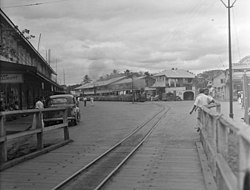List of sugar cane railways

- Labasa Mill Tramway, 1894 to 1982
- Rarawai–Kavanagasau Light Railway, from 1914
Sugar cane grew wild in Fiji and was used as thatch by the Fijians for their houses (bures). The first attempt to make sugar in Fiji was on Wakaya Island in 1862 but this was a financial failure. With the cotton boom of the 1860s there was little incentive to plant a crop that required high capital outlay but after a slump in cotton prices in 1870, the planters turned to sugar. In an effort to promote the production of sugar in Fiji, the Cakobau Government, in December 1871, offered a 500-pound reward for the first and best crop of twenty of sugar from canes planted before January 1873.
The first cane sugar mill in Fiji was built in 1872 by Brewster and Joske near to the present site of the Government Buildings in the capital city of Suva. [1] By the end of 1874, there were four mills in operation, six by the end of 1875 and ten by the end of 1878. Most of these mills crushed for only a few years and only a few survived the crash in sugar price of 1884. The surviving mills were Navua Sugar Mill, Panang Mill, Holmshurst (Taveuni) and the Rewa Sugar Company (Koronivia).
The arrival of the Colonial Sugar Refining Company led to the establishment of Commercially viable sugar mills. In 1880, John Bates Thurston went to Australia seeking investment for Fiji and persuaded the Colonial Sugar Refining Company (CSR) to extend its operations to Fiji. The first mill built by the CSR was the Nausori Sugar Mill on the banks of the Rewa River and began crushing in the 1882 crushing season. In 1883, construction began for its second mill in Ba, the Rarawai Mill. Another mill was built at Viria, also on the Rewa River, and crushed from 1886 to 1895. It was closed because it was too small to be viable. In 1890, the Labasa Mill was erected from a dismantled mill in Queensland.
By 1926 all other sugar mills had closed down and the CSR owned the five existing mills in Fiji of which Nausori mill closed down in 1959.

{{cite book}}: CS1 maint: location missing publisher (link)